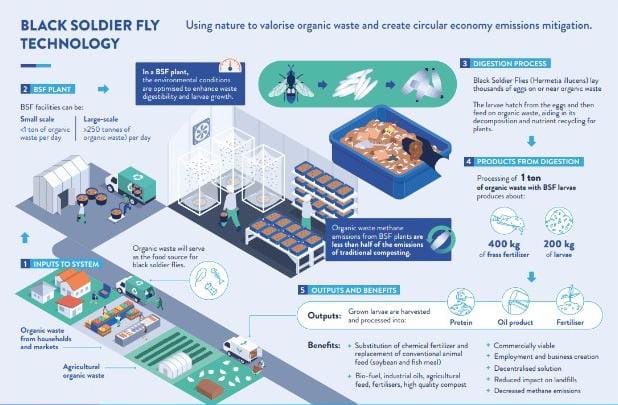The black soldier fly (Hermetia illucens) has recently gained global attention for its remarkable ability to contribute to sustainable practices, particularly in food production and waste management. Originally found in warm, tropical climates, this insect has now adapted to environments worldwide, thriving in areas rich in organic waste. With an extraordinary life cycle that turns waste into valuable resources, the black soldier fly stands as a powerful symbol of environmental stewardship and circular economy innovation.
Measuring 16–20 millimetres in length, the adult black soldier fly features a sleek, metallic black body that resembles a wasp. Despite its formidable appearance, the adult fly is entirely harmless—it doesn’t bite, sting, or spread disease. The true magic happens in the larval stage. These greyish-white, legless larvae, voraciously consume organic waste, including food scraps and manure. In doing so, they convert discarded material into nutrient-dense biomass, rich in proteins and fats. This larval biomass is processed into high-quality feed for livestock such as poultry, fish, pigs, and pets, creating a sustainable alternative to traditional animal feeds.
Beyond its role in producing animal feed, the black soldier fly also contributes to soil health. After the larvae have completed their feeding cycle, the remaining organic residue, known as frass, is an excellent source of natural fertilizer and soil conditioner. This by-product helps to close the loop in waste management systems by turning waste into renewable resources, reducing the need for chemical fertilisers and promoting healthier soils.
The lifecycle of the black soldier fly is both rapid and efficient:
– Eggs are laid in batches near decaying organic material.
– The larvae feed voraciously on the waste for 2-4 weeks, rapidly growing in size.
– Once fully developed, the larvae enter the pupal stage, ultimately emerging as adults, whose primary function is reproduction.
– Adults live for only a few days, during which their sole focus is to reproduce and continue the cycle.

The black soldier fly (BSF) represents an attractive business model, thriving on continuous supply of feedstock (waste) and turning it into valuable products, with minimal investments. BSF-based businesses are rapidly expanding across Africa, tapping into a global market that is projected to reach a value of $3.96 billion by 2033.
Requirements for a Successful BSF Project:
To establish and maintain a successful BSF project, several prerequisites must be met.
- Climate: BSF larvae flourish in warm, stable conditions, with optimal temperatures ranging from 24°C to 30°C.
- Humidity: Consistent humidity levels above 60% are essential for healthy larval development.
- Feedstock Supply: A reliable and homogeneous source of organic waste, such as food and kitchen scraps, is crucial for sustained larval feeding.
- Market Demand: A well-established market for larvae and their by-products, including animal feed and compost, is necessary for commercial success.

Benefits of BSF
The black soldier fly has garnered attention for its wide-ranging practical applications, providing numerous benefits across various sectors:
- Waste Management: BSF larvae are nature’s most efficient recyclers, adeptly converting organic waste into usable biomass. Their ability to process food waste and other organic by-products offers an environmentally friendly solution to reduce landfill use, thereby mitigating waste disposal challenges.
- Sustainable Protein Source: With the increasing demand for animal feed, black soldier fly larvae present a sustainable alternative. Rich in high-quality proteins and essential fats, they are ideally suited for feeding chickens, pigs, and fish within sustainable farming systems.
- Economic Value: Interest in BSF farming is on the rise, as businesses leverage these insects for both waste management and cost-effective animal feed.
-The market for black soldier fly larvae is projected to experience significant growth, with estimates suggesting it could reach $3.4 billion by 2030, driven by a compound annual growth rate (CAGR) of 33.7%. (Meticulous Research, 2024).
-Similarly, the market for frass, the nutrient-rich by-product of larvae digestion, is expected to reach $317 million by 2029, growing at a CAGR of 24.3%. This underscores the economic potential not only for protein production but also for sustainable fertilisers that enhance soil health.
4. Climate Change Mitigation. Conventional organic waste treatment methods can emit methane and CO2, exacerbating climate change. However, case studies demonstrate that BSF technology can significantly reduce greenhouse gas (GHG) emissions from the waste sector. The frass produced boosts soil’s carbon sequestration capabilities. By replacing conventional feeds and synthetic fertilisers with BSF outputs, further GHG savings in agriculture can be realised, contributing to efforts against global warming. Thus, BSF technology supports low-carbon food production and plays a pivotal role in reducing GHG emissions from waste management practices.
Challenges and Considerations
Despite their numerous benefits, several challenges must be addressed to facilitate their widespread adoption. Regulatory hurdles in some regions impede the approval of BSF larvae for use in animal feed. Additionally, barriers such as limited funding, insufficient knowledge about BSF technology, inadequate infrastructure, and poor stakeholder coordination often complicate the scaling of BSF projects.
Overcoming these obstacles will require targeted awareness-raising and training for key stakeholders, alongside significant infrastructure investment. In addition, implementing financial mechanisms and supportive policies is essential to create market access for new natural alternatives to synthetic fertilisers and conventional animal feed.
Future prospects
The future for black soldier flies looks promising, with their industrial applications expanding, particularly in sustainable farming and waste management. As the global demand for eco-friendly solutions to food security and waste challenges grows, black soldier fly farming is poised to play a crucial role.
Scientists are actively exploring biobased options to optimise the growth and efficiency of black soldier flies, which could enhance their utility across various industries. Ongoing research may lead to breakthroughs in sustainability, including the extraction of valuable materials from larvae, such as chitin, which is utilised in cosmetics, pharmaceuticals, and food processing.
Conclusion
The black soldier fly exemplifies how nature’s processes can be harnessed to address climate and food security challenges. From waste management to sustainable protein production, the role of the black soldier fly continues to grow. As we seek innovative solutions to the pressing issues of our time, this unassuming insect may hold the key to a more sustainable and resilient future.
References
https://images.app.goo.gl/RcgbK1LCDYkPP7TJ6
https://images.app.goo.gl/MEWbXWwbX2Fk69pZ6

CE Program Manager at ACEN Foundation
